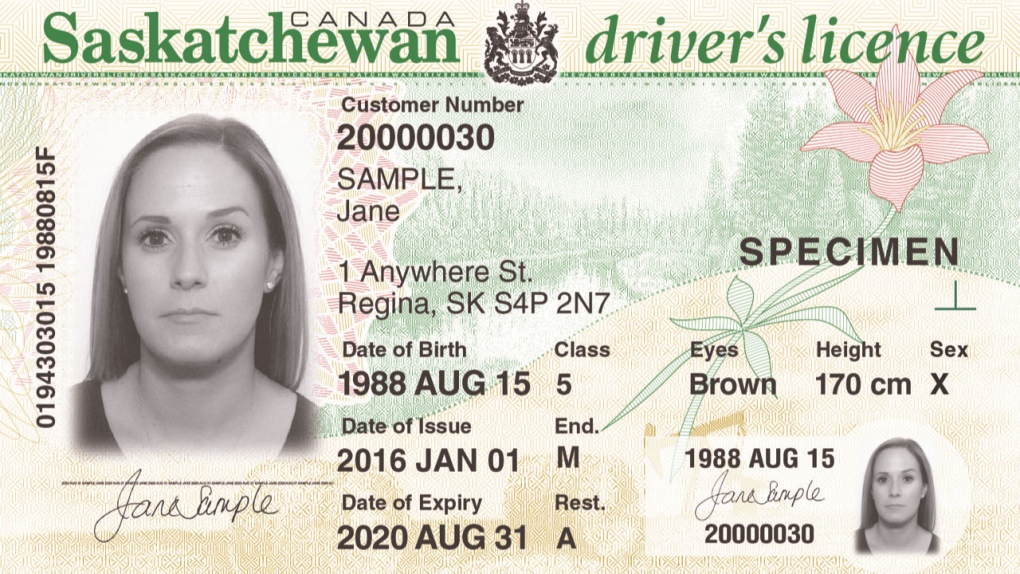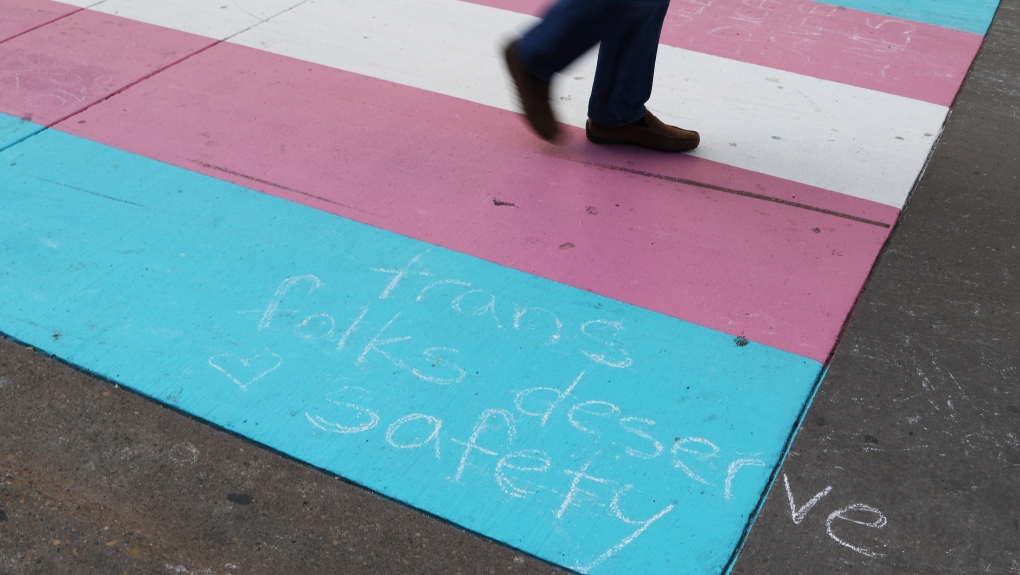Trans, non-binary community deplores Quebec delay in issuing gender-neutral health cards
When a Superior Court judge overturned parts of Quebec's civil code in 2021 that prevented a person from changing their sex on their birth certificates, it was hailed as a major victory by trans and non-binary people.
But two years after the landmark ruling that forced the government to change the law, Quebecers who don't identify as male or female are accusing the province of dragging its feet in getting other departments to adapt to the new rules.
Montreal resident Alexe Frédéric Migneault can't get a Quebec health card that corresponds to their gender identity.
Migneault, who uses gender-neutral pronouns, received a new birth certificate in May 2021 that has no sex marker on it after requesting one from the Directeur de l’état civil, the body that issues documents related to official acts, such as births, deaths, marriages, and civil unions.
But after submitting an application to the Régie de l'assurance maladie du Québec (RAMQ) to request a new health card without a sex marker, the provincial health insurance board wrote them a letter saying that the government's computer systems "do not allow for this type of change to the health insurance card."
"I was just floored at how slowly everything was moving because we've known since January 2021, that the X sex marker was coming to the papers in Quebec. So it's been two years now," Migneault told CTV News.
The RAMQ can currently only issue health cards with an "M" or "F" sex marker. The "X" sex marker is not an option, nor is issuing a health card with no sex marker at all.
RAMQ told them that the government has created an "interministerial committee" in order to "develop policy proposals, particularly with regard to the display of gender markers in government-issued identity documents, in order to ensure governmental consistency."
Migneault said they are frustrated with the delay that is putting them and others in bureaucratic limbo and what they described as a lack of empathy when dealing with RAMQ staff.
"That feels incredibly disrespectful and incredibly, just, dismissive of them. I wish that they took the responsibility towards the whole Quebec population, not just binary people, and gave us the answers that we need," Migneault said.
"I would like them to recognize that our rights and our identities are just as valid as everybody else.”
Ontario has allowed residents to select X on their health cards since 2016. The following year, the province also allowed drivers to have the option to display X on their licences instead of M or F.
Other provinces are also ahead of Quebec in allowing residents to opt for gender-neutral health and ID cards in recent years, including Saskatchewan, British Columbia, Manitoba, and Nova Scotia.
 A Saskatchewan driver's licence is seen in this supplied image.
A Saskatchewan driver's licence is seen in this supplied image.
The RAMQ declined an interview request from CTV News, but said in an email that it is "sensitive to the situation" and is looking at its options to process applications from people wishing to update their health cards to reflect their gender identities.
Spokesperson Caroline Dupont confirmed RAMQ is participating in the government-wide committee, led by the Ministry of Justice, "to provide a coherent response to these requests."
"Discussions are also underway with the [the Ministry of Health] to evaluate the impact on clinical services in our health care institutions."
The justice ministry said in a statement via email that the judge's ruling only affects civil status documents, such as birth certificates, and that the "scope of the decision is therefore limited to civil status records."
RAMQ DELAY IS 'DISAPPOINTING': LAWYER
Audrey Boctor, the lead lawyer for the plaintiffs who won the court challenge in 2021, said she didn't expect there would be a debate about applying the new law to other official government documents in Quebec.
"I'm disappointed that it's still so difficult, considering how many years of battle it took for the communities to bring this litigation forward," she said in an interview on Monday.
"[It took] two years to get a judgment, so it's disappointing to see that it's still taking this long."
Boctor said Quebec "should be certainly applying this to other types of documents," such as health cards and driver's licences.
 In this file photo, a person walks on a trans Pride flag crosswalk in Calgary on Sunday, Aug. 18, 2019. THE CANADIAN PRESS/Dave Chidley
In this file photo, a person walks on a trans Pride flag crosswalk in Calgary on Sunday, Aug. 18, 2019. THE CANADIAN PRESS/Dave Chidley
As of May 5, 2021, Migneault had a birth certificate and a health card that didn't correspond to each other.
It's the type of situation that Superior Court Justice Gregory Moore sought to rectify in his decision, which underlined the harm it causes to non-binary and trans people.
In his 160-page judgment, Moore wrote, "it is clear" that preventing people from obtaining an official document that corresponds to their true gender identity "contributes to discrimination, victimization, stigma, and social rejection, which are all risk factors for suicide."
WHAT CHANGED AFTER THE 2021 RULING?
This coming Saturday will mark the two-year anniversary of what many considered an "historic human rights decision" from Quebec's Superior Court.
On Jan. 28, 2021, Justice Moore struck down several articles of the Civil Code of Quebec. In addition to overturning provisions around sex markers on acts of birth, he also overturned articles that required non-binary parents to be identified as either the mother or father of a child, rather than just being referred to as a parent in official records.
The limitations of the code "deprived them of the dignity and the equality that they are owed," the judge wrote in his decision.
The judge gave Quebec until Dec. 31, 2021, to amend the civil code to make it comply with the ruling. In October of that year, Justice Minister Simon Jolin-Barrette tabled Bill 2 to make a host of sweeping changes to family law in Quebec but had to ask for the court-imposed deadline to be extended to June 17, 2022.
 Quebec Justice Minister Simon Jolin-Barrette tables a legislation called An Act respecting family law reform with regard to filiation and amending the Civil Code in relation to personality rights and civil status at the legislature in Quebec City, Thursday, Oct. 21, 2021. THE CANADIAN PRESS/Jacques Boissinot
Quebec Justice Minister Simon Jolin-Barrette tables a legislation called An Act respecting family law reform with regard to filiation and amending the Civil Code in relation to personality rights and civil status at the legislature in Quebec City, Thursday, Oct. 21, 2021. THE CANADIAN PRESS/Jacques Boissinot
Quebec withdrew sections of its controversial Bill 2 after backlash from advocates of the trans and non-binary communities who decried the requirement for gender-affirming surgery for people to change their sex designation in official documents.
The revamped bill finally passed on June 7, 2022, with just days left before the new deadline.
AT LEAST 151 REQUESTS SINCE LAST SUMMER
For the trans and non-binary community, getting other Quebec government departments to be on the same page is "one of our strongest demands right now," said Celeste Trianon, a Montreal-based trans rights activist.
According to figures obtained by Trianon through an access-to-information request and shared with CTV News, the Directeur de l’état civil received 151 applications to change the sex marker to X between May and September of last year.
During that same period, the government authorized 88 requests for the X sex marker on official documents.
The figures show that there were three requests in May and June of last year, but then applications skyrocketed to 105 in July 2022 alone, the month after Quebec adopted Bill 2.
 Trans activist Celeste Trianon is a law student at the Université de Montréal and promotes trans rights in the city. SOURCE: Celeste Trianon/Facebook
Trans activist Celeste Trianon is a law student at the Université de Montréal and promotes trans rights in the city. SOURCE: Celeste Trianon/Facebook
Trianon said she believes the number of people who have made similar requests to be much higher in Quebec, which has Canada's third-largest trans and non-binary community, according to the most recent federal census.
"It's, frankly, ridiculous how long the Quebec government is taking" to adapt to the new law, she said, pointing to the fact that advocates launched their first constitutional challenge against the government in 2014, and that the changes have been a long time coming.
Adam Jivraj is the community engagement coordinator at the Centre for Gender Advocacy, an independent, student-funded organization at Concordia University. The non-profit group and four individuals were the plaintiffs in the landmark 2021 ruling that brought sweeping changes to family law in Quebec.
Jivraj said Migneault's struggle reminds him of his own experience navigating health care as a trans person in Quebec. RAMQ took a while to change the sex marker on Jivraj's health card and was forced to use his old one, he said.
"You see the pharmacist and they kind of look at you, confused when they look at your card. And they kind of question like, is this even you? Is this your card?" he said.
According to Jivraj, RAMQ "really has a responsibility to answer to the needs of trans and non-binary folks in Quebec and to be consistent with changes in the legislation that have been made."
In Migneault's case, they didn't want to wait for a new health card. As soon as they received their birth certificate without a sex marker on it in May 2021, they cut up their RAMQ card into little pieces.
They said they have no regrets, even if it means they now have to pay out-of-pocket for some health services normally covered by the RAMQ.
"Just not to have to disclose my sex to a receptionist, a security guard, or on telephone lines — not giving that info has been so liberating. It was a big source of anxiety," they said.
Migneault anticipated waiting just a few months for RAMQ to update their systems.
Nineteen months later, the Montrealer is still waiting for the government to modernize.
CTVNews.ca Top Stories

Prime Minister Trudeau to meet Donald Trump at Mar-a-Lago
Prime Minister Justin Trudeau has landed in West Palm Beach, Fla., on Friday evening to meet with U.S.-president elect Donald Trump, sources confirm to CTV News.
'Mayday! Mayday! Mayday!': Details emerge in Boeing 737 incident at Montreal airport
New details suggest that there were communication issues between the pilots of a charter flight and the control tower at Montreal's Mirabel airport when a Boeing 737 made an emergency landing on Wednesday.
Hit man offered $100,000 to kill Montreal crime reporter covering his trial
Political leaders and press freedom groups on Friday were left shell-shocked after Montreal news outlet La Presse revealed that a hit man had offered $100,000 to have one of its crime reporters assassinated.
Questrade lays off undisclosed number of employees
Questrade Financial Group Inc. says it has laid off an undisclosed number of employees to better fit its business strategy.
Cucumbers sold in Ontario, other provinces recalled over possible salmonella contamination
A U.S. company is recalling cucumbers sold in Ontario and other Canadian provinces due to possible salmonella contamination.
Billboard apologizes to Taylor Swift for video snafu
Billboard put together a video of some of Swift's achievements and used a clip from Kanye West's music video for the song 'Famous.'
Musk joins Trump and family for Thanksgiving at Mar-a-Lago
Elon Musk had a seat at the family table for Thanksgiving dinner at Mar-a-Lago, joining President-elect Donald Trump, Melania Trump and their 18-year-old son.
John Herdman resigns as head coach of Toronto FC
John Herdman, embroiled in the drone-spying scandal that has dogged Canada Soccer, has resigned as coach of Toronto FC.
Weekend weather: Parts of Canada could see up to 50 centimetres of snow, wind chills of -40
Winter is less than a month away, but parts of Canada are already projected to see winter-like weather.

































